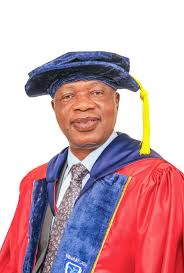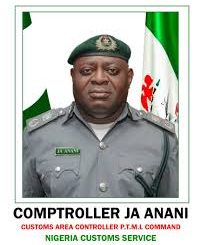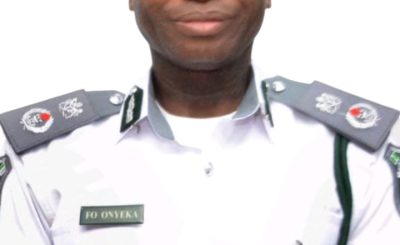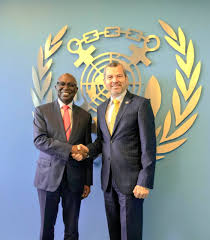By Our Correspondent
Bashir Adewale Adeniyi, Comptroller General, Nigeria Customs Service (NCS), appears to have thrown a challenge to the younger generation of officers to manage their time wisely and pay much attention to improving their education.
In spite of being the Customs Comptroller General, and incidentally the Chairman of the World Customs Organisation (WCO), headquartered in Brussels, Belgium, with a demanding workload both within and outside the country over the last two years, he was said to have successfully defended his Ph.D. programme in Leadership and Strategic Studies at the Federal University of Lokoja, in the north-central state of Kogi.
Already, the Customs Comptroller General, who was said to have made efforts in the past to complete his doctoral studies but was unsuccessful due to the schedule of duties at the Customs Headquarters in Abuja, the Federal Capital Territory (FCT), which often took him outside the country, could not hide his feelings on Saturday, October 18, 2025, when he was conferred with his Ph.D. degree in Leadership and Strategic Studies during the University Convocation Ceremony.
Being one of the recipients of the Ph.D. degree from the Kogi-based university in Lokoja was said to have attracted dignitaries from across the country, including officials of government-related agencies and the Customs, who joined him in celebrating the academic achievement and his leadership qualities that have taken the Service to a higher level.
Even without earning a Ph.D. degree in Leadership and Strategic Management, CGC Adeniyi had demonstrated that he was a born leader with the way he had been running the affairs of the Service and overseeing the Management team and officers since June 1, 2023. Both retired and serving officers are proud of him.

Many believe that with the CGC’s Ph.D. degree in Leadership and Strategic Studies, he will effectively coordinate the Service’s core responsibilities of trade facilitation and enforcement at the nation’s seaports and land border areas without waiting for briefs from the Area Controllers or Zonal Coordinators, who basically rely on the reports of the Area Controllers.
Maritime analysts would want officers to take their jobs seriously in their enforcement operations at the seaports and land border areas, as well as in dutifully checking international travellers and their luggage, cargo, and mail to forestall the concealment of dangerous drugs like Tramadol and weapons.
They argued that CGC Adeniyi has been well-equipped to protect businesses against illegal trade malpractices, enforce the country’s import and export restrictions and prohibition lists through the use of intelligence, and ensure that the Service meets its yearly revenue target. Take, for instance, the 2025 fiscal year: the Service has a ₦6.5 trillion revenue target, with much of the revenue expected to be generated and paid into the Federation Account from the Apapa and Tin Can Island Commands.
While the Apapa Command, which oversees more than 60% of the country’s imports, has a revenue target of ₦3 trillion, the Tin Can Island Command, another Lagos-based Customs Command, has a revenue target of ₦1.5 trillion.
Given the CGC’s determination to meet and even surpass the ₦6.5 trillion revenue target with a significant margin, this may have informed why he has beamed his searchlight on the Commands’ operations to ensure the right thing is done. The two Area Controllers, who are expected to generate more than 50% of the Service’s 2025 total revenue, were said to have tightened security at their respective seaports and blocked areas of revenue leakage.
This is to avoid playing into the hands of the Customs Comptroller General, who is well-equipped to go deep into asking questions on the Commands’ operations and not accepting, without scrutiny, whatever reports are presented to him on a daily, weekly, or monthly basis by the Area Controllers or officers on official assignment.
The CGC, who has acquired new leadership skills, appears to have positioned himself for the major tasks ahead in the Service and his role in coordinating the affairs of the 186-member WCO Council Sessions, where final decisions regarding the Organisation’s work and activities are agreed upon.
Note that the WCO Chairperson plays a vital role in bringing together the views of the 186 members to guide the work of the global community. This may have informed the CGC’s further studies, which earned him a Ph.D. in Leadership and Strategic Management Studies, a step in the right direction and a commendable achievement.
No former CGC of the NCS has received as much acclaim as Adeniyi over his Ph.D., not even Hameed Ali, a retired Army Colonel, who raised the Service’s yearly revenue collection to the trillion-naira level, putting it in the ranks of the Nigerian National Petroleum Corporation (NNPC), now Nigerian National Petroleum Company Limited (NNPCL), following the signing into law of the Petroleum Industry Bill (PIB) by former President Muhammadu Buhari in August 2021, and the Department of Revenue, formerly known as the Federal Inland Revenue Services Commission (FIRSC).

The officers and men of the Service, who are very happy that the CGC could make out time, despite his workload both within and outside the country, to pursue his Ph.D. degree in Leadership and Strategic Studies at the University of Lokoja, Kogi State, were said to have congratulated him on the academic achievement. They noted that the academic success “reflects his unwavering commitment to excellence, knowledge, and visionary leadership.”
Ik Oladeji, an Assistant Comptroller General (ACG), Finance and Strategic Studies, who is also the National Coordinator, Operation Whirlwind, was said to have joined Customs Area Controllers across the country, including Comptroller Godwin Otunla of Ogun I Command, in former President Olusegun Obasanjo’s home state, and Frank Okechukwu Onyeka, overseeing the Tin Can Island Command, to celebrate the CGC on his new academic laurels.







